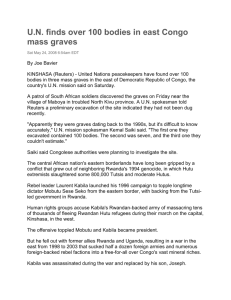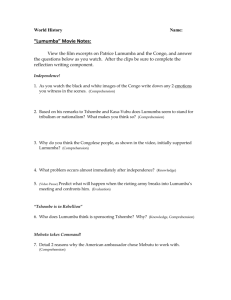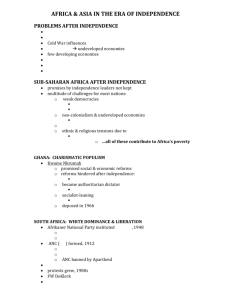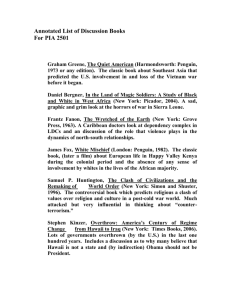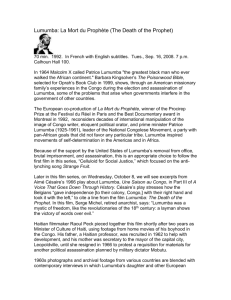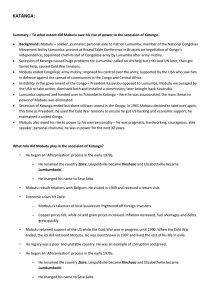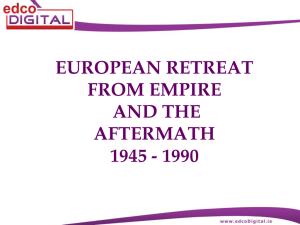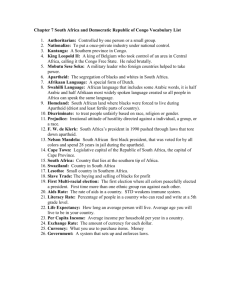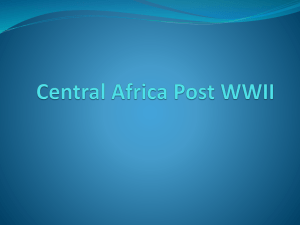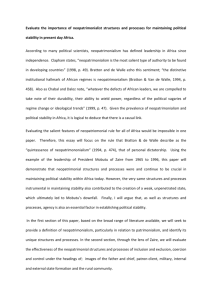CONGO TO ZAIRE – AND BACK When I was an English
advertisement
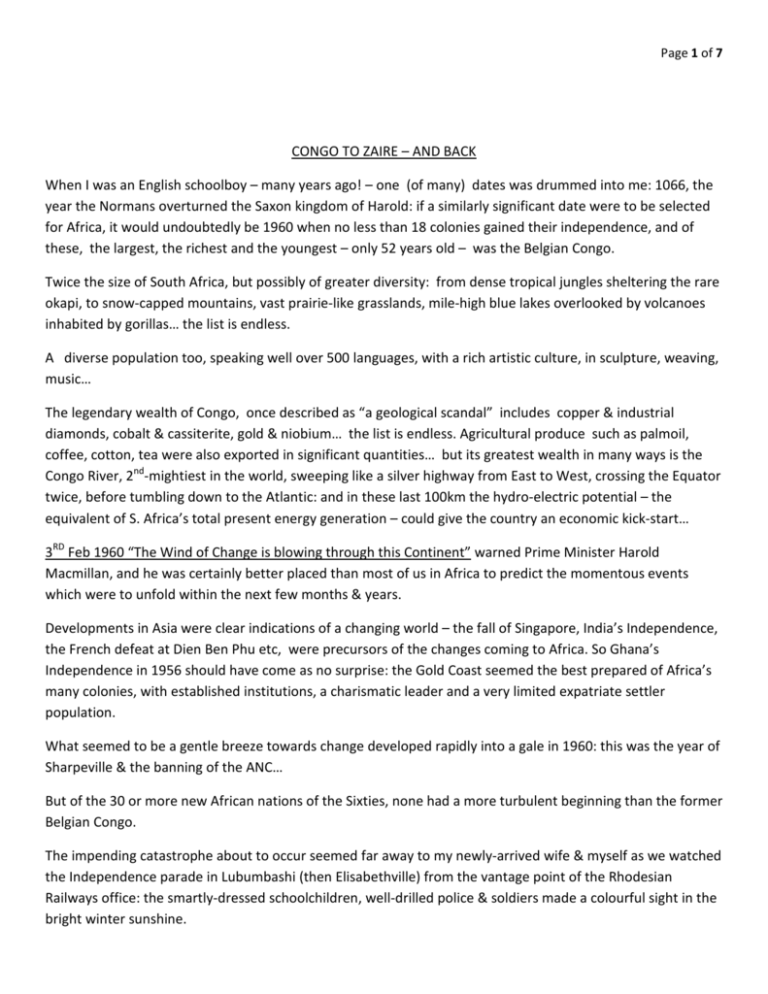
Page 1 of 7 CONGO TO ZAIRE – AND BACK When I was an English schoolboy – many years ago! – one (of many) dates was drummed into me: 1066, the year the Normans overturned the Saxon kingdom of Harold: if a similarly significant date were to be selected for Africa, it would undoubtedly be 1960 when no less than 18 colonies gained their independence, and of these, the largest, the richest and the youngest – only 52 years old – was the Belgian Congo. Twice the size of South Africa, but possibly of greater diversity: from dense tropical jungles sheltering the rare okapi, to snow-capped mountains, vast prairie-like grasslands, mile-high blue lakes overlooked by volcanoes inhabited by gorillas… the list is endless. A diverse population too, speaking well over 500 languages, with a rich artistic culture, in sculpture, weaving, music… The legendary wealth of Congo, once described as “a geological scandal” includes copper & industrial diamonds, cobalt & cassiterite, gold & niobium… the list is endless. Agricultural produce such as palmoil, coffee, cotton, tea were also exported in significant quantities… but its greatest wealth in many ways is the Congo River, 2nd-mightiest in the world, sweeping like a silver highway from East to West, crossing the Equator twice, before tumbling down to the Atlantic: and in these last 100km the hydro-electric potential – the equivalent of S. Africa’s total present energy generation – could give the country an economic kick-start… 3RD Feb 1960 “The Wind of Change is blowing through this Continent” warned Prime Minister Harold Macmillan, and he was certainly better placed than most of us in Africa to predict the momentous events which were to unfold within the next few months & years. Developments in Asia were clear indications of a changing world – the fall of Singapore, India’s Independence, the French defeat at Dien Ben Phu etc, were precursors of the changes coming to Africa. So Ghana’s Independence in 1956 should have come as no surprise: the Gold Coast seemed the best prepared of Africa’s many colonies, with established institutions, a charismatic leader and a very limited expatriate settler population. What seemed to be a gentle breeze towards change developed rapidly into a gale in 1960: this was the year of Sharpeville & the banning of the ANC… But of the 30 or more new African nations of the Sixties, none had a more turbulent beginning than the former Belgian Congo. The impending catastrophe about to occur seemed far away to my newly-arrived wife & myself as we watched the Independence parade in Lubumbashi (then Elisabethville) from the vantage point of the Rhodesian Railways office: the smartly-dressed schoolchildren, well-drilled police & soldiers made a colourful sight in the bright winter sunshine. Page 2 of 7 True: in the preceding months, rumours of “the cook will take the car and the gardener your wife” were fairly common, but discounted, as there existed (so we thought) the guarantee that Belgium would stay on to oversee a smooth transition.. But only days later, we were told by the British Consul – the S. African consul having been expelled the day after Independence – that we should leave town immediately and head for the safety of neighbouring Northern Rhodesia (Zambia). At the border, we found ourselves in a five-mile queue of cars, blocked by an officious customs officer, insisting on proper completion of all paperwork … finally the barrier was pushed aside, and we were welcomed by smart N. Rhodesian police who saluted us as we sped by! By mid-August, the UN had mounted the biggest international peacekeeping force yet seen. 1958-1965 LUMUMBA – MOBUTU - TSHOMBE Patrice Lumumba, largely self-taught and a brilliant orator, was politically inspired following a visit to Accra in 1958, where he met not only Nkrumah but also Kaunda, Nyerere and many other future leaders. He dominated the early negociations in Brussels, and then led his party (MNC-Lumumba) to victory in the 1960 elections. At the independence banquet King Baudouin made a patronizing speech “It is now up to you, gentlemen, to show that you are worthy of our confidence” he told the Congolese dignitaries. Prime Minister Lumumba responded with a blistering critique of the colonial government, almost precipitating a royal walk-out: and to add insult to injury, the king’s ceremonial sword was snatched from him while parading slowly past in the motorcade.. A few days later, at a military camp outside Kinshasa, Congolese NCO’s & soldiers (the officers were all Belgians) jealous of the perks enjoyed by the politicians, complained that they were no better off than before. The Commanding officer drew a diagram on a blackboard: “Before Independence = After Independence” which had the immediate effect of provoking a mutiny, followed by riots, attacks, rapes & looting. Lumumba reacted by sacking the entire officer corps, appointing a former sergeant as army commander and his trusted aide, Joseph-Desiré Mobutu as Chief of Staff. As the mutiny spread across the country, Lumumba called in the United Nations to restore order, but the country was already disintegrating: not only did the diamond-rich Kasai province refuse to recognize the authority of the central government, but more seriously, Moise Tshombe, political leader of mineral-rich Katanga, declared: “We are seceding from chaos”. A particularly nasty war then ensued between the UN (Ethiopians, Irish, Swedes, Indians & many more…) and Katanga (Belgian-supported Katangese & mercenaries) the most notable being “Mad” Mike Hoare – about more later. Page 3 of 7 The war dragged on for over 2 years, and caught wide international attention when UN Secretary-General Dag Hammarskjold was killed when the aircraft on which he was travelling for a meeting with Tshombe, crashed in Zambia. The causes of the accident were the subject of numerous investigations, but none were conclusive. A possible explanation was pilot error: he confused NDOLO airport in Kinshasa with NDOLA in Zambia, and met the ground a few hundred metres earlier than expected… Meanwhile, events in Kinshasa had brought prominence to Col. Mobutu, the army Chief of Staff, who had been identified by the CIA as a suitably Western-leaning counterweight to Lumumba, whose pro-Soviet/antiUN actions brought the US under-secretary of state to label him “an irrational, almost psychotic personality”. Pressure was brought to bear on President Kasa-Vubu, described by the US Ambassador at the time as ”naïve, not very bright & lazy” to dismiss his Prime Minister and appoint a more reliable politician. Needless to say, Lumumba reacted violently to this, by attempting to dismiss both the President and the new Prime Minister. In the ensuing stand-off, Lumumba found himself under virtual house arrest in the official residence, surrounded by a first ring of UN troops to protect him from the 2nd ring of anti-Lumumbist troops. Mobutu then stepped in and declared that he would take charge, together with a hand-picked team of young university graduates & technocrats, until the end of the year. Caught after an attempted escape, Lumumba was bundled off to Katanga where he was murdered. This was a relief for Larry Devlin, the CIA Station Chief in Kinshasa, who had been stalling on instructions from Langley to “eliminate” the troublesome Lumumba – with poisoned toothpaste… The early 1960’s brought a series of ineffectual Prime Ministers, incapable of preventing or stopping several localized rebellions, the most serious being the “Simbas”, who at one point captured the regional capital of Kisangani. With the ending of the Katanga war, Tshombe was invited to form a Govt. of National Unity and called in his mercenary friend “The Mad Bloodhound, Mike Hoare” as he was called by the E. German radio – to counter this new threat: an Irish WW2 Captain, he rapidly put together a 300-man (mainly S. Africans) “Task Force” called “5 Commando” and with the help of CIA-trained Cuban exiles, Belgian paratroopers & American planes, saved (most of) the hostages and handed the country back to the Congolese Army Commander, a certain Gen. Joseph Mobutu – who, a few months later, embraced him after pinning a medal on his chest! Devlin described Mike Hoare as: “well-educated, articulate, a man of tremendous charm”, but his mercenary career ended after the failed Seychelles coup of 1978. The legend lives on in the film “The Wild Geese” where Hoare’s role was played by Richard Burton. Page 4 of 7 1965 – 1997 THE RISE AND FALL OF MOBUTU Towards the end of 1965 the country was in a new political impasse: the rebel-turned Prime Minister Tshombe had been sacked by President Kasavubu, and once again Mobutu stepped in to “Save the Country” and stop it “sliding into chaos & corruption”. For “only five years”, he said. But he remained, very much in full control for the next 32 years. Only 34 years old at the time, with a background limited to a short stint as a journalist, he nevertheless possessed intelligence, charm, superior political skills and…utter ruthlessness. This was demonstrated a few months later when four former cabinet ministers were tried for treason & publicly hanged in front of 50000 spectators in Kinshasa’s main square. Tshombe, forced into exile in Spain, was kidnapped to Algeria while flying in a private jet, and died in mysterious circumstances. Mobutu moved swiftly to control the country, and in particular, the economy. Surprisingly, perhaps, his first decision was the nationalization of insurance, an obvious cash-cow – particularly if claims never get paid! But the mining industry, with the giant Union Miniere - one of the world’s biggest copper, cobalt & uranium producers – was the main prize, and for some years after being nationalised, continued to operate normally. Within a few years, thanks to stability in the country and sensible financial & economic management, Congo became the darling of the West, and particularly the US, with many of the big names opening up operations GM, Ford, Goodyear, Citibank, to name just a few. With financial help from Western Institutions, huge infrastructural projects were launched. Many were of dubious value, such as the $250mio. steel mill designed to operate with ore from yet-to-be opened mines – so it operated at 10% capacity, due to the limited availability of scrap iron! Another example: the expansion of the Inga hydro-electric dam on the lower Congo together with the longest high-voltage transmission line in the world. This was a purely political decision, so that Mobutu in Kinshasa could just turn out the lights in distant, secessionist Katanga! Mobutu celebrated his fifth year in power, and the country’s 10th birthday, with an impressive parade: 200 horses had been imported from Argentina, and platoons of soldiers (trained by Belgian Gendarmerie) to ride them: decked out in gold epaulettes, powder-blue tunics and fur busbys, they trotted down Kinshasa’s main Boulevard towards the Presidential podium. Unfortunately, a red carpet leading to the podium panicked the cavalcade which tried to turn & flee, only to be faced by clattering Korean tanks belching smoke….. Pandemonium! In 1971, Mobutu was at the apogee of his reign, but he took a step which many found difficult to comprehend: in one fell swoop, the country’s name, its currency and its river changed to Zaïre, and Page 5 of 7 “Authenticity” was decreed to be mandatory. This meant wearing “National dress”, called “Aba-cost”, no “European” ties and only using “authentic” names – eg Mobutu Sese Seko Kuku Ngbendu wa za Banga. The reasons for the “authenticity”soon became clear, when it was decreed that 2000 foreign-owned enterprises should be “Zairianised” and handed over to officials & extended family surrounding the President. The big contracts with foreign companies had generated lucrative “commissions” for the sycophants but this merely whetted their appetite for more! Plantations, breweries, cigarette manufacturers, textile mills etc. were distributed like sweets at a children’s party; how ironic that just 30 years later Mugabe used the same method with white-owned farms, for much the same reasons: but a significant difference is that whereas Mobutu “de-zairianized” within a couple of years (following strong pressure from western lenders) Zimbabwe’s land grab has acquired an appearance of permanency. Although it only became apparent much later, this was the turning point for Mobutu, as his greed seemed to increase and Zaire’s decline became irreversible. Many have speculated on the reasons, with one of the most intriguing suggested by his American physician, Dr Close, in his book “Beyond the Storm”: 1971 was the year his mother, Mama Yemo, died, and the profound influence she had over his actions was lost. Certainly, by 1974 CIA’s Larry Devlin found a man profoundly changed from the charismatic young leader he’d known 10 years earlier): “Mobutu, exposed to only beer before, had learned to enjoy his drink…his choice was pink champagne, the Hollywood movie stars tipple. He was already round the bend, more paranoid, more convinced of his own infallibility. He was surrounded by yes-men who were constantly telling him how wonderful,, how brilliant, how marvelous he was, what an extraordinary mind he had. All I could think of were the stories I’d read about the court of Henry VIII or Louis XIV”. (quotation from Michaela Wrong “In the Footsteps of Mr Kurtz”). But many elements contributed to his decline and fall, even though this took over 20 years: • His inability to differentiate between his personal expenditure & the country’s wealth • Angolan independence resulted in closure of the Lobito-Katanga railway, at a time when the copper price fell sharply, drastically reducing income from the mines (much of which was already being pocketed by the regime) • Corruption, mis-management and virtual collapse of Government & of the monetary system – although it should be said that Zaire’s currency inflation was moderate compared to Zimbabwe’s ! The end of the Cold War in 1989 had the effect of bringing renewed pressure on Mobutu to allow some form of political freedom, but events caught up with him: • Army pay was several months in arrears – and anyway, never kept up with endless hyper-inflation, so in 1991 they just turned onto the well-stocked Kinshasa shops, warehouses and even private homes, Page 6 of 7 and helped themselves. The biggest claim of my insurance career was the S. African Metro Cash & Carry” facility: over $5mio. of goods removed from their shelves in four hours! • 18 months later the same scenario, but with more loss of life, took place. On this occasion, my wife’s LandRover was summarily taken off her at gun-point, by soldiers who “just needed to fetch more ammunition”.. but, ex Africa aliquid nova, she got it back a few hours later, delivered to the British Embassy compound, where she’d gone to take refuge! Meanwhile, far to the East, a new element came into the equation: the genocide in Rwanda… 1997 – 2010 KABILA l & KABILA ll The man who toppled Mobutu, Joseph Kabila, had been a supporter of Lumumba and also taken part in the SIMBA rebel army. In the mid-60s he was an ineffectual revolutionary, described by Che Guevara as being “addicted to drink & women”. Nevertheless, to Presidents Museveni & Kagame he was the answer to a prayer: they needed a Zairean figurehead for the campaign they were planning to unleash on Eastern Zaire, where several hundred thousand Interahamwe (Youth Militia) had fled following the genocide, and whose actions were harassing the Kagame government. Their plan succeeded beyond all expectations – not thanks to Kabila, but because Mobutu’s Zaire was so rotten, the army of bootless child soldiers was able to cross the whole country, and march into Kinshasa in May 1997. The new, self-appointed President Kabila turned out to be an even more disastrous administrator than his predecessor, so much so that the puppet-masters in Rwanda & Uganda mounted a daring raid to topple him: this involved airlifting troops over 1500km to capture an army base on the coast, from where they could close off the port of Matadi and turn off the power to Kinshasa, 250km away. At this point, Angola stepped in to prevent a vacuum in Congo (NB: the new regime had renamed Zaire..) which could harbour bases for the UNITA rebel movement, and together with Zimbabwe – eager for a share of the spoils – restored Kabila to the throne. The riposte from Uganda/Rwanda was to virtually take over Eastern Congo, splitting the country into 4 areas dominated by different neighbours, who then proceeded to fight among themselves for control of the abundant resources, particularly coltan (a tantalum ore used in mobile phones). The fighting, killing, plundering and destruction continued for over 6 years, and has been described as the worst catastrophe since WW2, with as many as 4-6 mio. casualties, many from starvation and untreated wounds & sickness; once again the UN has had to intervene, with an 18000-strong peacekeeping force. On the political front, after Kabila’s assassination in 2001, his rather shy & unassuming son Joseph took over and has succeeded rather better than was ever expected. It was his decision to start negociations with opponents and to allow UN intervention. Page 7 of 7 In recent years, South Africa has played a significant role in bringing stability and some form of democracy to Congo. The 2002 Sun City negociations resulted in a provisional peace agreement, and by 2006, after approving a new Constitution by referendum, Joseph Kabila was elected President for a 5-year term: so elections are due this year… CONCLUSION Why has the Congo had such an unusually troubled transition to independent nationhood? (1) Belgium is often blamed for poor colonial management and lack of preparation, but the facts show otherwise: • Firstly it is important to make a clear distinction between King Leopold’s so-called Congo Free State (1885-1908) and Belgian Congo): despite a Great Depression & 2 World Wars, in 50 years Congo’s GDP increased 100-fold, to about $25 bio. Furthermore, it was considered by many commentators to be a “model” colony, with far higher percentages of its budget being spent on education & healthcare than in S. Africa. Migrant labour was not permitted, and mineworkers were housed with their families, social services provided etc • It is certainly true that there were few university graduates in 1960 – Congo’s first university only started in 1955 – but there were excellent primary & secondary schools (mostly church-run), together with technical schools and apprentice-ship programmes that produced a highly efficient workforce. Belgium was however opposed to the methods used in the French Colonies of West Africa, where a small elite was sent to study in France to form the nucleus of an intelligentsia. The thinking was: we have 80-100 years for this exercise, let’s bring the whole country up to a level where a true grass-roots democracy can flourish… But, of course, those plans were blown away by the “Wind of Change”… (2) An alternative culprit is “The West” or “Neo-Colonialism” but it is clear that when a power vacuum exists, it will be filled by some external force: the most extreme example of this is the Al-Quaida influence in Somalia. Western leaders at the time argued convincingly that intervention was essential to avoid a Communist take-over: this was the era of “the domino effect” and Congo was considered a formidably important “domino”. (3) The inevitable conclusion is that Congo was very badly served by its leaders: Lumumba was no Mandela, and whereas Mobutu started out promisingly, he came, sadly, to exemplify Lord Acton’s famous remark: “Power tends to corrupt and absolute power corrupts absolutely”. (Acton continued: “ Great men are almost always bad men”). And Kabila l: Che Guevara said it all! Denis Le Jeune UCT Summer School lecture 20 January 2011
